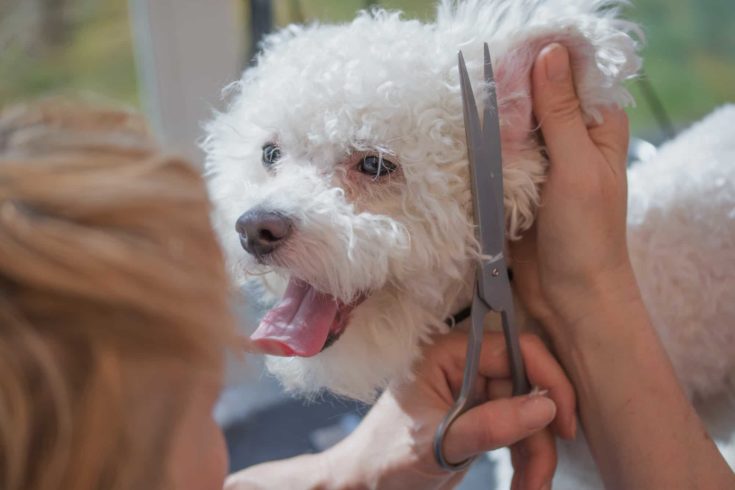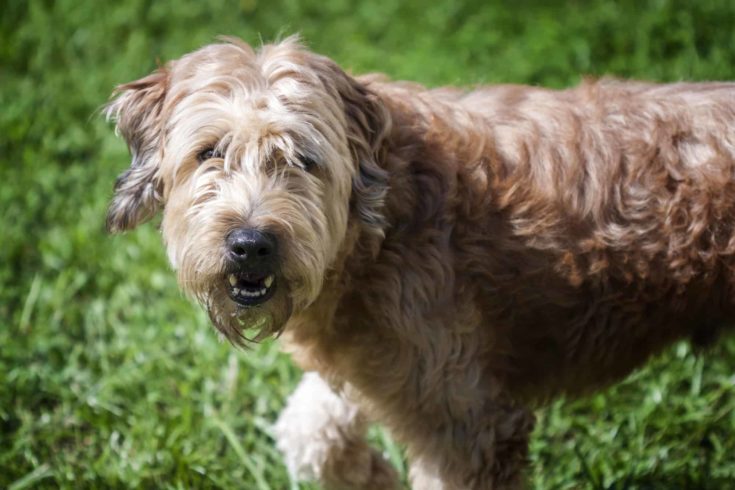Goldendoodles first appeared as a designer breed back in 1969, when writer Monica Dickens began breeding the dogs. However, Doodles didn’t get really popular until the 1990s. Now, these crossbreeds are just about the most popular dogs on the block!
So, what makes Goldendoodles such popular family pets? Well, these dogs are proven to be friendly, intelligent, trainable, and loving. But is there a downside to Goldendoodle ownership?
Read this guide to discover the pros and cons of owning a Goldendoodle.
Table of Contents
Are Goldendoodles A Good Breed?

Goldendoodles are undoubtedly popular, but are they a good breed? Although there are always exceptions to every rule, most Goldendoodles tend to have the same pros and cons.
First, let’s take a look at the good things about these beautiful dogs.
Family-Friendly Dogs
If you’re looking for a dog that will make a good family pet, there are certain qualities that you need in your canine companion, including:
- A loving, friendly temperament
- Trustworthiness
- Reliability
- Affectionate
- Fun-loving
A forgiving nature is also essential if you have kids that are likely to want to rough house the dog and dress their furry friend in doggy clothes. Also, you want a dog that has plenty of energy as children often love to spend hours playing with their pet in the backyard.
The Goldendoodle ticks all those boxes, making these dogs the perfect choice for active families.
Temperament

The Goldendoodle typically has a wonderful temperament! That’s why these dogs are commonly used as therapy dogs and service dogs, helping those with physical health problems and mental conditions, such as PTSD.
The Doodle is a friendly character that gets along well with people, kids, and other pets. These dogs are affectionate, loyal, and loving, enjoying playtime and snuggle time in equal measure. The Goldendoodle does not have a reputation for aggression and will get along well with other dogs, cats, and even your family’s small furries.
These are lively dogs that will happily join in with outdoorsy activities and games of all kinds, too. Whatever you’re doing, the Goldendoodle typically wants to be a part of that!
Minimal Shedding
Goldendoodles have a percentage of Poodle genes in their makeup, depending on the backcross that’s been used.
Poodles are a single-coated breed that barely sheds at all. Poodles have non-shedding coats, so, basically, the more Poodle parent breed the Goldendoodle has in its DNA, the less the dog will shed. That’s great news for you if you want to spend more time enjoying exercising or training your pet rather than vacuuming your home!
Hypoallergenic Qualities

Goldendoodles are reputedly hypoallergenic dogs, making them an ideal canine companion for pet allergy sufferers.
Basically, the curlier your dog’s coat, the more Poodle it has in its makeup, so the less it will shed. Pet allergies are actually caused by the dander. Dander consists of dead skin cells and saliva, which falls off the dog as it walks around your home. When someone walks across the floor, the fallen dander is stirred up, floating into the air and triggering allergies.
When the dog sheds hair, dander is carried with it. So, the less the dog sheds, the less dander is circulated around your home. That’s why these dogs are considered to be less likely to trigger pet allergies than those that are medium or heavy shedders.
Highly Intelligent
Goldendoodles are highly intelligent dogs with an outgoing personality that are generally very quick to learn.
Of the two parent breeds, it’s the Poodle that’s credited with being one of the smartest dog breeds around. The Golden retriever is regarded as more loving, loyal, and chilled-out, but not as intelligent.
So, if you have a multi-gen puppy that has a large amount of Poodle genes, your pet is probably going to be easier to train and teach than an F1 Doodle with 50% Golden retriever DNA.
Easy To Train
The Goldendoodle is a crossbreed that’s created by breeding a purebred Poodle and a purebred Golden retriever. As described above, the more Poodle genes that your Doodle has, the more intelligent he is likely to be.
However, both those parent breeds were originally created as working dogs for the hunting field, retrieving shot waterfowl from marshes and ponds. So, not only are Goldendoodles excellent swimmers and hunting companions, but they are also highly trainable and eager to please their handlers.
Most Goldendoodle owners report that their dogs are extremely easy to potty train and learn basic commands incredibly quickly. Socialization training is also essential for puppies, and taking your highly trainable Doodle along to weekly sessions with a professional dog trainer can be a fun, useful experience for both you and your pet.
The intelligent Doodle responds best to positive reinforcement training methods, such as food rewards and praise. So, if you just want an obedient family pet, you’ll find training your Goldendoodle a breeze!
Hybrid Vigor

Goldendoodles are a mixed breed, or hybrid, created by mating two purebred dogs. F1 Goldendoodles take 50% of their genetic makeup from each parent. As such, F1 Doodles exhibit what’s commonly known as “Hybrid Vigor.”
Hybrid Vigor is a phenomenon that occurs in animal breeding when two purebred, unrelated lines are crossed to create a hybrid. The offspring typically grows better and is healthier than either of the parents. So, in the case of Goldendoodles, the puppies take on the best traits of both parent breeds, provided that the parents are health-screened as being free from genetic abnormalities.
However, the degree of Hybrid Vigor that’s present in the puppies diminishes as the degree of backcrossing increases and the purity of the parent lines decreases.
Longevity
Unlike many large purebred dogs, Goldendoodles have a relatively long lifespan of up to 16 years and even longer in some cases. Generally, smaller dogs live a little longer than large ones. So, if you want a companion pet to enjoy for a long time, Goldendoodles are a good choice.
What Is The Downside Of Owning A Goldendoodle?
So, you can see that the Goldendoodle is an all-around good dog that can make a wonderful family pet.
But do these furry angels have a downside?
Goldendoodles Need Lots Of Exercise

If you want a couch potato, don’t buy a Goldendoodle!
As both parent breeds are bred to be working dogs, the Goldendoodle does have a high exercise requirement. Ideally, these dogs need at least two long walks each day, as well as some playtime with their owners.
If your dog doesn’t get the exercise he needs, he will become frustrated, which can lead to behavioral problems, such as destroying toys and excessive barking.
Goldendoodles Are Expensive Dogs
Thanks to their many attributes, Goldendoodles are extremely popular dogs, and puppies are in high demand.
Often, reputable breeders have long waiting lists for puppies, and prices are quite high. In the current market, you can expect to pay upwards of $2,000 for a Goldendoodle puppy, regardless of what size dog you want. If you want a curly-coated Doodle that’s a minimal shedder, you can expect to pay more than you would for an F1 or straight-coated Goldendoodle.
If you don’t want a puppy, you might be able to adopt an adult dog from a shelter or rescue. However, you will still be required to make a sizable donation toward the shelter’s running costs.
Separation Anxiety

As I mentioned above, Goldendoodles love to be around their human owners. In fact, these dogs can be described as clingy! That’s a beautiful thing until you have to go out.
Unfortunately, Goldendoodles need the company of their family to feel secure and happy. That’s a problem for many families who took on a puppy during lockdown when there was always someone around at home. Once you return to work and your kids go back to school, your dog will be left home alone for hours at a time. Goldendoodles can suffer greatly from separation anxiety, resorting to destructive behavior, barking, digging, trying to escape, and forgetting their housetraining. In extreme cases, some dogs even eat their feces. Yuck!
If you do have to go out for long periods, leaving your Goldendoodle home alone, you should ideally recruit a dog walker to take your pet for a walk while you’re away. Alternatively, take your Goldendoodle to a dog sitter for the day.
Those options are a practical way to keep separation anxiety at bay, but they are also quite costly.
Grooming Requirements

When it comes to grooming, are Goldendoodles high maintenance?
Well, that all depends on the generation of Goldendoodle you own and his coat type.
Generally, dogs with straight or wavy coats require brushing every other day to remove loose underfur and keep shedding to a minimum. However, Doodles with very curly coats need daily brushing to prevent the hair from matting and tangling.
Many owners opt to take their Goldendoodle to a professional groomer every four to six weeks to have the coat clipped. Although you still need to brush your dog every day, the likelihood of matting is greatly reduced if the dog’s coat is shaved. Unless you opt to clip your dog yourself, you will have to pay a groomer to do the job for you, adding to the cost of owning your Doodle.
Mucky Pups
Goldendoodles love to go hiking with their human owners or take a trip to the dog park. Unfortunately, these pups also love to get down and dirty, rolling in mud, swimming and splashing in filthy puddles and ponds, and exploring brambles and undergrowth.
That means a serious clean-up job for you before you can let your Doodle back into your home!
Boisterous!

Goldendoodles are great fun to have around, and they love a romp in the back garden with you and your kids or get involved in a social game with the other pups down at the dog park. However, the Goldendoodle can also be an excitable breed, which can translate to jumping up at visitors, barking, and overexuberant play.
Destructive Behavior
Every puppy loves to chew, especially when teething. However, Goldendoodles can be serial chewers, even as they grow out of puppyhood.
But, as long as you’re aware of that potential issue, you can make sure that anything valuable is kept out of your Doodle’s reach. You should also invest in some high-quality chew toys for your pet or make your own DIY toys to save money.
Not For Apartment Living
As the Goldendoodle is such an active, lively breed, these dogs are not a good fit for apartment living. There’s simply not enough space in a small home for an energetic dog.
Doodles generally do better in a larger home with a fenced yard where they can enjoy a game and burn off their excess energy, as well as having plenty of daily exercise in the form of walks.
Health

Although well-bred Goldendoodles are generally healthy dogs, they can be prone to a couple of common health conditions that potential owners should be aware of.
Sensitive Digestion
Some Goldendoodles can have sensitive tummies and are intolerant to some kinds of foods.
If your dog suffers from that condition, your pet may be prone to occasional bouts of diarrhea if he eats something that disagrees with him. However, you can usually take preventative measures and avoid tummy upsets if you stick to feeding your Goldendoodle the correct, balanced diet and don’t feed him tidbits from your own plate.
Skin Allergies
If you don’t keep up with brushing your Goldendoodle regularly and thoroughly, his underfur will become tangled and matted. When that happens, the hair pulls at the dog’s skin, causing irritation and discomfort. The dog then nibbles or scratches at the irritant, damaging the skin and potentially triggering a skin infection.
Be sure to brush your dog every day if he’s curly-coated or every other day for straight or wavy coats. As you’re grooming your pet, check his skin for signs of redness or irritation, and consult your vet if you’re concerned.
Congenital Defects

If you buy your puppy from a reputable breeder, the pup’s parents and grandparents will be health-screened for potential hereditary health problems. Only dogs that are free from such defects are used for breeding purposes, and puppies generally come with a health guarantee.
However, if you buy your puppy from a backyard breeder or puppy mill, you run the risk of taking home a dog that will develop serious health issues, such as hip dysplasia, Addison’s disease, and cataracts.
In Conclusion
Did you find our guide to Goldendoodle’s pros and cons helpful and interesting? If you enjoyed the article, please take a moment to share it.
We think that our research shows the Goldendoodle to be an intelligent, energetic, fun-loving dog that loves to be around his human handlers. Doodles are affectionate, lovable playmates for kids and adults alike, making wonderful companions for people and other family pets alike. Also, Goldendoodles have what’s considered to be a hypoallergenic coat.
On the downside, these popular pups can be expensive to buy, and their grooming requirements and energy levels might prove off-putting for some would-be dog owners.
If you have a Goldendoodle, we’d love to know about his good and not-so-good points! Share with us in the comments box below!